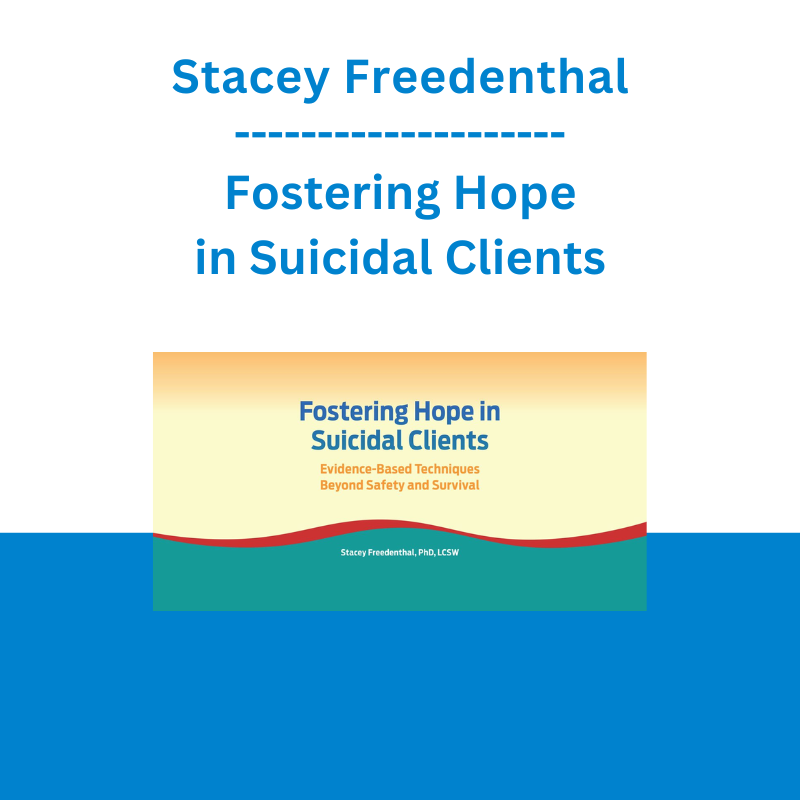*** Proof of Product ***
Exploring the Essential Features of “Stacey Freedenthal – Fostering Hope in Suicidal Clients: Evidence-Based Techniques Beyond Safety and Survival”
Speaker: Stacey Freedenthal, PhD, LCSW
Duration: 1 Hour 58 Minutes
Copyright: Mar 18, 2023
Media Type: Digital Seminar
Description
When your client expresses a desire to die, it’s not enough to assess suicide risk and make a safety plan. You also need to help the person want to live. How can you facilitate such a critical shift amid feelings of dangerous despair? Drawing from evidence-based practices such as cognitive behavior, mindfulness, and acceptance therapies, this session will cover techniques for generating hope, healing, and reasons for living. You’ll explore how to:
- Apply specific strategies to inspire hope and problem-solving in the suicidal person
- Use techniques from evidence-based therapies to help clients challenge suicidal thoughts
- Help clients relate differently, via acceptance and observation, to their suicidal thoughts
Speaker
Stacey Freedenthal, PhD, LCSW, is an associate professor at the University of Denver Graduate School of Social Work and a psychotherapist in private practice. She’s the author of Helping the Suicidal Person: Tips and Techniques for Professionals and created the website Speaking of Suicide.
Speaker Disclosures:
Financial: Dr. Stacey Freedenthal is a psychotherapist and consultant in private practice and has an employment relationship with the University of Denver. She has a family member with an employment relationship with LivingWorks. She receives royalties as a published author. Dr. Freedenthal receives a speaking honorarium and recording royalties from Psychotherapy Networker and PESI, Inc. She has no relevant financial relationships with ineligible organizations.
Non-financial: Dr. Stacey Freedenthal is a member of the International Association of Suicide Prevention, the National Association of Social Workers, and the American Association of Suicidology. She uses CBT, CAMS, ACT, and other evidence-based suicide prevention strategies in her presentation.
Objectives
- Justify the role of hope-based questions and actions during risk assessment, safety planning, and beyond.
- Apply at least two strategies to inspire hope and problem-solving in the suicidal person.
- Execute at least two methods for helping clients identify reasons for living.
- Perform at least two methods from cognitive behavior therapy to help clients challenge suicidal thoughts and related problems such as hopelessness.
- Utilize at least two techniques to help clients relate differently, via acceptance and observation, to their suicidal thoughts.
Outline
- The two fundamental goals of treatment with suicidal clients
- Doing clinically useful risk assessment and safety planning and how to integrate hope-based techniques to enhance effectiveness
- Building hope and identifying reasons for living
- Challenging hopelessness and cognitive constriction using cognitive behavior therapies
- Strategies for fostering mindfulness and acceptance
- Limitations of research and potential risks
Target Audience
- Counselors
- Social Workers
- Psychologists
- Marriage & Family Therapists
- Addiction Counselors
- Physicians
- Physician Assistants
- Nurses
- Nurse Practitioners
- Other Mental Health Professionals
Please see the full list of alternative group-buy courses available here: https://lunacourse.com/shop/










 SMB - Options Training
SMB - Options Training